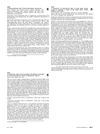 21 citations,
July 2014 in “Clinics in Dermatology”
21 citations,
July 2014 in “Clinics in Dermatology” Hormonal contraceptives can help treat acne by affecting sebum production and androgen levels.
 May 2021 in “The Journal of clinical and aesthetic dermatology”
May 2021 in “The Journal of clinical and aesthetic dermatology” Most women with hair loss using 5% topical Minoxidil are satisfied with the treatment, but hair loss still affects their daily habits and social life.
 April 2023 in “IP Indian journal of clinical and experimental dermatology”
April 2023 in “IP Indian journal of clinical and experimental dermatology” Lichen planus is a chronic autoimmune disease that is hard to treat and more common in women.
 52 citations,
June 1999 in “Endocrinology and Metabolism Clinics of North America”
52 citations,
June 1999 in “Endocrinology and Metabolism Clinics of North America” Antiandrogen treatments combined with oral contraceptives can help manage hair growth and hair loss in women with PCOS.
 38 citations,
October 1996 in “Dermatologic Clinics”
38 citations,
October 1996 in “Dermatologic Clinics” Certain hormone treatments can improve acne and related conditions in women.
 1 citations,
October 2018 in “InTech eBooks”
1 citations,
October 2018 in “InTech eBooks” Only minoxidil and finasteride are FDA-approved for hair loss, with other treatments available but less effective or with side effects.
 January 2004 in “Side effects of drugs annual”
January 2004 in “Side effects of drugs annual” Certain skin drugs and topical agents, including some natural extracts and fragrances, can cause allergic reactions. Some hair dyes and extensions, as well as minoxidil, a hair growth treatment, can also cause allergies. Botulinum toxin A can effectively reduce sweat but may have temporary side effects.
 November 2023 in “Aktualʹnì problemi sučasnoï medicini”
November 2023 in “Aktualʹnì problemi sučasnoï medicini” The guidelines suggest using various treatments, including antidepressants and steroids, for alopecia areata and discuss the condition's genetic and immune aspects.
 2 citations,
March 2021 in “Cosmetics”
2 citations,
March 2021 in “Cosmetics” Hair transplant surgery is the most effective, safe, and satisfying treatment for hair loss.
 5 citations,
January 2020 in “Skin appendage disorders”
5 citations,
January 2020 in “Skin appendage disorders” Oral dutasteride works better for hair loss, but has more sexual side effects; intralesional dutasteride is a possible alternative.
 5 citations,
February 2019 in “Oral and Maxillofacial Surgery”
5 citations,
February 2019 in “Oral and Maxillofacial Surgery” Hair loss can be reversed or even cured using advanced hair restoration techniques, with rare complications like swelling and bleeding.
March 2023 in “Asian Journal of Beauty and Cosmetology” HX109 herbal extract helps hair grow by boosting cell growth and reducing cell death.
 14 citations,
September 2015 in “Expert Opinion on Therapeutic Targets”
14 citations,
September 2015 in “Expert Opinion on Therapeutic Targets” The conclusion is that while oral contraceptive pills are effective for PCOS-related high androgen levels, new treatments with fewer side effects are needed.
 June 2017 in “Journal of The American Academy of Dermatology”
June 2017 in “Journal of The American Academy of Dermatology” Microneedling with PRP and minoxidil (5%) improves hair growth more than minoxidil (5%) alone.
 2 citations,
December 2023 in “Health Technology Assessment”
2 citations,
December 2023 in “Health Technology Assessment” Laser treatment and deroofing are effective options for hidradenitis suppurativa.
3 citations,
March 2022 in “Archives of Dermatological Research” September 2022 in “International Journal of Trichology” Both microneedling and injections are equally effective for treating alopecia areata.
 29 citations,
November 2012 in “Journal of The European Academy of Dermatology and Venereology”
29 citations,
November 2012 in “Journal of The European Academy of Dermatology and Venereology” Use 5% minoxidil or oral finasteride for mild-to-moderate hair loss, combine with hair transplant for severe cases.
 23 citations,
October 2018 in “Expert Opinion on Drug Safety”
23 citations,
October 2018 in “Expert Opinion on Drug Safety” Consider benefits and risks of new alopecia treatments for safety.
 32 citations,
November 1996 in “International Journal of Dermatology”
32 citations,
November 1996 in “International Journal of Dermatology” Antiandrogens can help treat skin conditions like acne and excessive hair in women when used carefully.
 24 citations,
January 1993 in “Dermatologic Clinics”
24 citations,
January 1993 in “Dermatologic Clinics” Minoxidil effectively treats hair loss, works better for women, and requires consistent use.
 February 2021 in “Revue médicale de Liège”
February 2021 in “Revue médicale de Liège” Platelet-rich plasma injections are a promising new treatment for hair loss, showing initial positive results.
 2 citations,
September 2013 in “Journal of Cosmetic Dermatology”
2 citations,
September 2013 in “Journal of Cosmetic Dermatology” Hair restoration combines drugs and follicular unit grafting for natural, long-lasting results.
 1 citations,
April 2017 in “Drugs & Therapy Perspectives”
1 citations,
April 2017 in “Drugs & Therapy Perspectives” Use antiandrogens and other treatments for hair loss.
 June 2024 in “The Open dermatology journal”
June 2024 in “The Open dermatology journal” The herbal extract is as effective and safe as 3% minoxidil for treating hair loss.
 13 citations,
February 2022 in “JAMA Dermatology”
13 citations,
February 2022 in “JAMA Dermatology” Dutasteride is the most effective hair loss treatment after 24 weeks, but finasteride leads to the most hair growth after 48 weeks.
 2 citations,
October 2020 in “The Journal of clinical and aesthetic dermatology”
2 citations,
October 2020 in “The Journal of clinical and aesthetic dermatology” The herbal mix (Biochanin A, Acetyl tetrapeptide-3, and Ginseng Extracts) and the 3% Minoxidil solution are equally effective in treating hair loss, but the herbal mix has fewer side effects.
August 2022 in “International Journal of Health Sciences (IJHS)” The combined treatment significantly improved hair growth and thickness compared to the control group.
 May 2024 in “Pigment International”
May 2024 in “Pigment International” Several treatments are effective for pigmentary disorders like vitiligo and melasma.

























